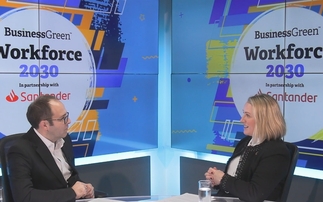Climate change poses an education challenge for the global business community, argues CISL's Paul Begley
Of all the Sustainable Development Goals, education (SDG 4) is arguably the most powerful. An educated society is the foundation of a stable, productive society. Education is both a requisite at the start of life, but also throughout life. Especially in today's dynamic world.
Businesses often have the longest-term planning horizon in any economy, access to the best talent and the capability for radical innovation. However, even the world's most powerful businesses are facing an education challenge.
Each year, when Fortune magazine publish their list of the world's 500 largest organisations, analysts draw some fascinating insights. The average chief executive is now 57 years old and, in many cases, members of the Board are much older. This means that the decision-makers behind some of the world's most influential organisations are likely to have received their last formal educational experience 30 or 40 years ago.
This time gap is not insignificant: over the past four decades, the world's population has increased by about three billion people, the average life expectancy has increased by over 10 years and the impacts on the environment has been significant.
And that rapid rate of change is set to continue. By 2030, we anticipate that the global population will increase further to 8.3 billion people, extreme weather events will become more frequent and technology will enable us to communicate globally. Collectively these shifts - social, environmental and economic - mean that decision-making will increasingly happen in a new volatile, uncertain, complex and ambiguous (VUCA) context.
Recalibrating to this 'new normal' will require people across society to embrace education.
The University of Cambridge Institute for Sustainability Leadership (CISL), helps senior people make better decisions in the new context. We enable people navigate the latest science, expand their thinking and explore the implications for their business strategy. Our work is designed to update the 'world view' of current leaders, to identify the future talent they require and to work with the wider system to influence which skills are being developed.
Many of the businesses we work with recognise that they face a challenge of developing their people. In 2017, we published a review of how leading companies are developing individuals with the ability to help their organisation thrive in the new context. This study, conducted with The Academy of Business in Society (ABIS), drew on conversations with sustainability professionals, Human Resources (HR) managers and Learning and Development (L&D) experts from over 20 multinational businesses. It found that:
-
Many organisations that participated in this study were adopting new ways to develop their talent. These ranged from intensive simulations to improve the capability of managers to make decisions in complex environments, to extensive experiential learning courses that help participants put themselves in the shoes of other stakeholders.
-
Progress on building the knowledge, thinking and practice around the new normal is slow. Often our interviewees identified misalignment between the sustainability team (which often has a good understanding of the changing social, environmental and economic context outside the business) and those functions responsible for people development and organisational learning within the company (which often have a significant influence over organisational culture and people's behaviour).
- Where businesses have tried to develop their staff for the new normal, they have seen benefits. Several of our interviewees reported that a strong position on sustainability helped increase employee engagement, attract and retain talent as well as inform approaches to innovation and support with brand and reputation.
One further important finding was that several interviewees reported the lack of education around sustainability was already costing the business.
On the flipside, proactively educating workers can help the business in a range of other ways. Equipping today's employees to understand the changing nature of risk and create new opportunities can improve organisational performance. As one interviewee said: "We need to balance how we keep our foot in the current while we also thresh out over the future, to ensure that the future does not take us by surprise."
Embracing the SDGs can also help businesses become more attractive to future employees. One recent survey by consultancy Global Tolerance indicated almost half the workforce want to work for an organisation that has a positive impact in the world, while 53 per cent would work harder if they were making a difference to others.
At the systems level, businesses are increasingly recognising the need to articulate and shape the skills they will need in the future. It is increasingly not appropriate for companies to rely on national education systems to produce talent that is suitable, rather they need to help all stakeholders understand the future of key sectors, the talent pipeline and the necessary skills. This proactive engagement will not be easy, but across our client list we hear from business leaders who recognise that already they struggle to find female engineers, suitable Board members with a 'systems perspective' or graduates with the interpersonal skills to adapt to the demands of an increasingly multi-generational workforce.
To deliver SDG 4 we need businesses that encourage their workers to be lifelong learners and to find ways to deploy their creativity and innovation to provide education for all.
Around the world, only seven out of 10 children participate in early childhood and primary education, but these numbers fall significantly in sub-Saharan Africa, North Africa and Western Asia. While these enrolment rates have improved, it is likely that without better provision, the life chances for millions will remain limited.
Finding effective ways to offer education to all is hard. Ensuring it is relevant to the needs of a future job market is even harder. But what's clear is that in the VUCA world, most of tomorrow's sought-after jobs have not been created yet.
Equipping people for this new world will require a different form of education. Business can - and are - already playing a role. Several businesses such as BT, CISCO and Microsoft, are making significant investments to give young people science, technology, engineering and mathematics (STEM) skills. Siemens and Saudi Aramco are producing kits to problem-solving skills and a love of learning. Light of Hope, a business that produces solar panel-powered classrooms, was recognised by Unilever in their 2018 Young Entrepreneurs Awards.
By engaging their current workforce, mapping future work needs and deploying their assets for good, business has a significant opportunity to shape the education agenda and deliver SDG 4.
Paul Begley, Director for Customised Programmes at the University of Cambridge Institute for Sustainability Leadership







